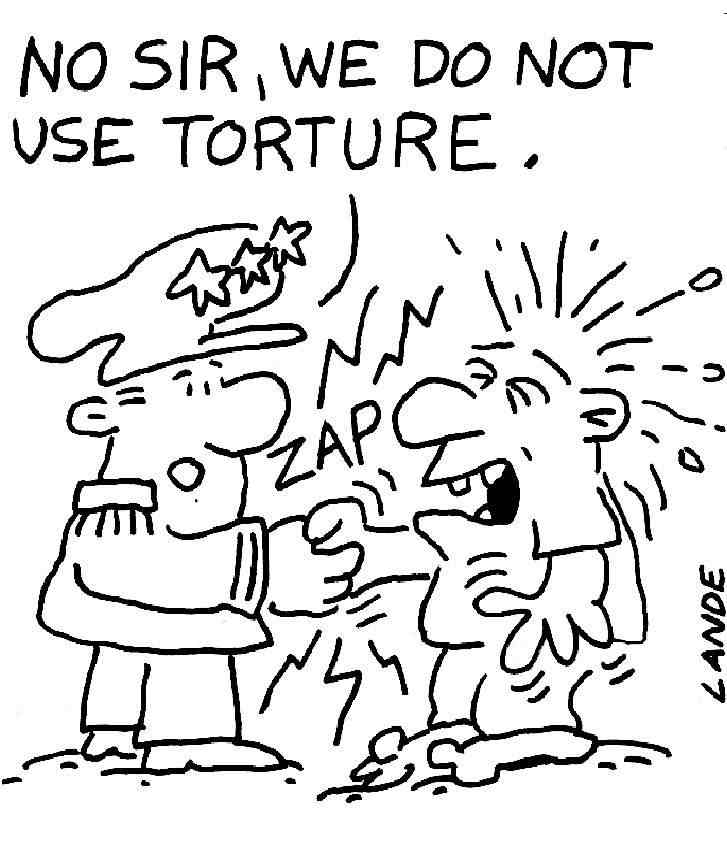|
Cartoons of
Dan McConnell
featuring
Tiny the Worm
Cartoons of
David Logan
The People's Comic
Cartoons of
John Jonik
Inking Truth to Power
|
Support the WA Free Press. Community journalism needs your readership and support. Please subscribe and/or donate.

image by Dick Lande
from March/April 2009 issue, posted Mar 15, 2009
Environmentally Oriented Defense
The military should be redirected
toward our biggest threat: nature
By Martin Nix
Ask people to name the major threats against this nation, and you will likely hear Iran, Korea, Sudan, Afghanistan.
In fact, this nation's number one security threat is natural disaster: hurricanes, tornados, droughts, floods, volcanoes, epidemics, famine, global warming, global cooling, hurricanes, and even incoming meteorites. If our national defense is not prepared for environmental disaster, the US will not only be vulnerable compared to other nations, we as a species may also become as extinct as the dinosaurs.
The threats are real. Certainly we could have been much better prepared for Katrina. Certainly we could do more to mitigate damage by floods and droughts. But consider some other more dramatic possibilities.
Yellowstone in Wyoming is a huge volcano, several times more dangerous than Mount St. Helens. When this volcano blows it will be nearly the equivalent of the entire USA nuclear arsenal. The eruption would destroy all life in Wyoming, put a layer of ash one foot thick over the entire East Coast, and put into the atmosphere so much dirt that sunlight will not get through, launching the entire planet into an ice age. Is there a way to stop Yellowstone from erupting? Some possibilities include Geothermal Development, or piping water from the Great Lakes, both of which could cool the magma. Equally challenging would be mitigating the many effects of an eruption.
Consider also the threat of an incoming giant meteorite. A collision with earth would wipe out the ecosystem as we know it.
Plagues affecting humans or our agricultural crops could kill billions.
Historically, the American Military has been used for mercenary reasons. Like it or not, Iraq has lots of oil, Vietnam has lots of oil, and Afghanistan is a proposed route for oil pipelines. The next war can be predicted where oil is: Chad, Nigeria, Angola, Sudan, Iran, Venezuela.
Use of the military for control of natural resources is not new. The Romans did it, so did the Ancient Persians, Greeks. Certainly Japan and Germany have in the past used the military for such economic gain. Now the US is no different, but that has got to change.
The military, and defense spending needs to be reoriented to defend America from true national security threats: namely, natural disasters.
In view of environmental collapse, conflicts with Iran, Iraq, Russia, and Afghanistan all look like small stuff.
Similarly, a nuclear attack on Russia--or anywhere--is also an attack on Planet Earth.
The military needs to change its counterproductive focus from mercenary operations, like Iraq, to focus on protection of the environment. This is not just an opinion. It is what has to be done. Currently, the military is very inadequately trained or equipped to assume this role.
A refocusing of the military will have major impact on defense contractor spending (i.e. more cargo planes, and fewer jet fighters). It will greatly affect the deployment of the military (i.e. the National Guard staying at home, not in Afghanistan). It will affect all aspects of business and government.
Even the motto of the Post Office will change to "Whether sleet, rain, snow or incoming meteorites, the Mail will get through!"
Instead of traditional military divisions, we may see the Army, Navy, Air Force, and Coast Guard regroup into divisions that defend the country from various types of environmental destruction.
Our current economic recession is caused--at least in part--by excessive spending on mercenary military operations. If we would instead put the military to work on a campaign for renewable energy, we could pull this nation out of economic depression like hydropower did during the 1930s.
As Jimmy Carter said, a good energy policy "is the moral equivalent of war."
Now the US is suffering from a huge national deficit, in a large part over wars for oil. But there are very efficient ways that we could make the conversion.
The dense nuclear pack of ICBMs in the Dakotas could change roles, in the service of blasting meteorites coming toward planet Earth.
The reserve of 5,000 nuclear bombs (many obsolete) could be re-engineered to become miniature nuclear reactors (hermetically sealed) to heat military bases and supply power to civilian evacuation shelters in case of a nuclear winter. These miniature reactors could also be containment for nuclear waste, and small enough to launched into the sun for future disposal.
Nuclear powered submarines could double as emergency power plants for disaster stricken coastal cities, or be used to pump deep-sea water to the ocean surface to stimulate algae growth to remove CO2.
Restoring and electrifying the railroads is one way of keeping the transportation systems. Trains get through snowstorms when highways don't.
I am philosophically opposed to the military draft. I see it as slave labor of youth. But if the draft were used to register the nation's youth to restore the environment or respond to environmental disaster, I have feeling it would be popular with youth.
Not that I have all the answers, but this will impact defense procurement. Do we need Air Force Tankers more for military invasion, or more for disaster relief if a big tidal wave hits the coast? Ignoring such issues is not an option.
President Obama has the opportunity to make a historic shift, refocusing the nation's military to defend ourselves from real national security threats. If you don't understand now, you certainly will. *


